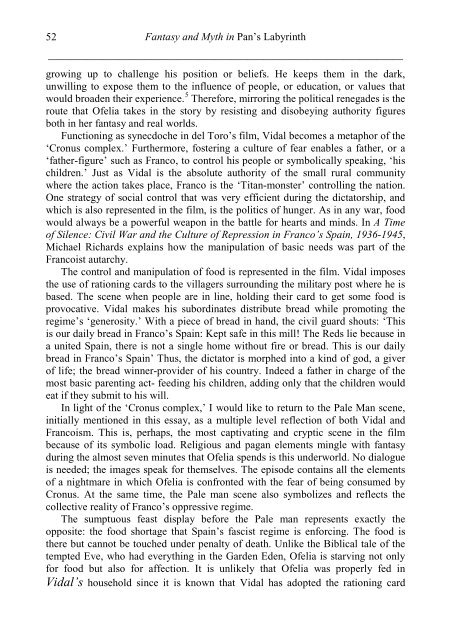Magic and the Supernatural - Lancaster University
Magic and the Supernatural - Lancaster University
Magic and the Supernatural - Lancaster University
You also want an ePaper? Increase the reach of your titles
YUMPU automatically turns print PDFs into web optimized ePapers that Google loves.
52<br />
Fantasy <strong>and</strong> Myth in Pan’s Labyrinth<br />
__________________________________________________________________<br />
growing up to challenge his position or beliefs. He keeps <strong>the</strong>m in <strong>the</strong> dark,<br />
unwilling to expose <strong>the</strong>m to <strong>the</strong> influence of people, or education, or values that<br />
would broaden <strong>the</strong>ir experience. 5 Therefore, mirroring <strong>the</strong> political renegades is <strong>the</strong><br />
route that Ofelia takes in <strong>the</strong> story by resisting <strong>and</strong> disobeying authority figures<br />
both in her fantasy <strong>and</strong> real worlds.<br />
Functioning as synecdoche in del Toro’s film, Vidal becomes a metaphor of <strong>the</strong><br />
‘Cronus complex.’ Fur<strong>the</strong>rmore, fostering a culture of fear enables a fa<strong>the</strong>r, or a<br />
‘fa<strong>the</strong>r-figure’ such as Franco, to control his people or symbolically speaking, ‘his<br />
children.’ Just as Vidal is <strong>the</strong> absolute authority of <strong>the</strong> small rural community<br />
where <strong>the</strong> action takes place, Franco is <strong>the</strong> ‘Titan-monster’ controlling <strong>the</strong> nation.<br />
One strategy of social control that was very efficient during <strong>the</strong> dictatorship, <strong>and</strong><br />
which is also represented in <strong>the</strong> film, is <strong>the</strong> politics of hunger. As in any war, food<br />
would always be a powerful weapon in <strong>the</strong> battle for hearts <strong>and</strong> minds. In A Time<br />
of Silence: Civil War <strong>and</strong> <strong>the</strong> Culture of Repression in Franco’s Spain, 1936-1945,<br />
Michael Richards explains how <strong>the</strong> manipulation of basic needs was part of <strong>the</strong><br />
Francoist autarchy.<br />
The control <strong>and</strong> manipulation of food is represented in <strong>the</strong> film. Vidal imposes<br />
<strong>the</strong> use of rationing cards to <strong>the</strong> villagers surrounding <strong>the</strong> military post where he is<br />
based. The scene when people are in line, holding <strong>the</strong>ir card to get some food is<br />
provocative. Vidal makes his subordinates distribute bread while promoting <strong>the</strong><br />
regime’s ‘generosity.’ With a piece of bread in h<strong>and</strong>, <strong>the</strong> civil guard shouts: ‘This<br />
is our daily bread in Franco’s Spain: Kept safe in this mill! The Reds lie because in<br />
a united Spain, <strong>the</strong>re is not a single home without fire or bread. This is our daily<br />
bread in Franco’s Spain’ Thus, <strong>the</strong> dictator is morphed into a kind of god, a giver<br />
of life; <strong>the</strong> bread winner-provider of his country. Indeed a fa<strong>the</strong>r in charge of <strong>the</strong><br />
most basic parenting act- feeding his children, adding only that <strong>the</strong> children would<br />
eat if <strong>the</strong>y submit to his will.<br />
In light of <strong>the</strong> ‘Cronus complex,’ I would like to return to <strong>the</strong> Pale Man scene,<br />
initially mentioned in this essay, as a multiple level reflection of both Vidal <strong>and</strong><br />
Francoism. This is, perhaps, <strong>the</strong> most captivating <strong>and</strong> cryptic scene in <strong>the</strong> film<br />
because of its symbolic load. Religious <strong>and</strong> pagan elements mingle with fantasy<br />
during <strong>the</strong> almost seven minutes that Ofelia spends is this underworld. No dialogue<br />
is needed; <strong>the</strong> images speak for <strong>the</strong>mselves. The episode contains all <strong>the</strong> elements<br />
of a nightmare in which Ofelia is confronted with <strong>the</strong> fear of being consumed by<br />
Cronus. At <strong>the</strong> same time, <strong>the</strong> Pale man scene also symbolizes <strong>and</strong> reflects <strong>the</strong><br />
collective reality of Franco’s oppressive regime.<br />
The sumptuous feast display before <strong>the</strong> Pale man represents exactly <strong>the</strong><br />
opposite: <strong>the</strong> food shortage that Spain’s fascist regime is enforcing. The food is<br />
<strong>the</strong>re but cannot be touched under penalty of death. Unlike <strong>the</strong> Biblical tale of <strong>the</strong><br />
tempted Eve, who had everything in <strong>the</strong> Garden Eden, Ofelia is starving not only<br />
for food but also for affection. It is unlikely that Ofelia was properly fed in<br />
Vidal’s household since it is known that Vidal has adopted <strong>the</strong> rationing card

















